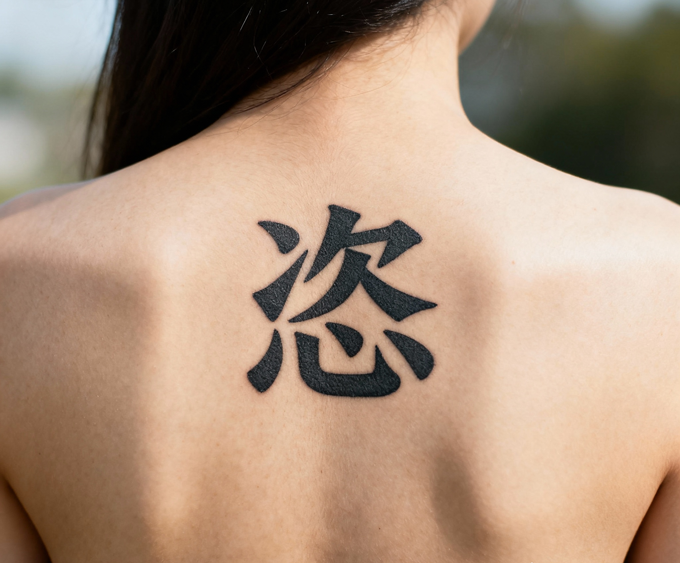
1. Direct Meaning and Breakdown of the Kanji "恣" (Shi / Hoshimama)
The kanji 恣 carries a complex and morally charged meaning.
Core Meaning: Self-indulgence, arbitrariness, capriciousness, doing as one pleases.
Keyword: Acting based on one's own selfish desires without regard for rules or others.
Pronunciation:
シ (Shi): The on'yomi (Sino-Japanese reading).
ほしいまま (Hoshimama): The native kun'yomi reading, meaning "arbitrary," "capricious," or "at one's own pleasure."
Etymological Breakdown:
The character 恣 is composed of two parts:
心 (Kokoro - "heart" or "mind" radical): This places the character's meaning in the realm of emotion, desire, and intention.
次 (Ji - "next," "secondary"): This component contributes to the sound, but it also carries a connotation of "following" in a sequence.
One interpretation is that 恣 represents a "heart that follows its own (desires) next," immediately and without hesitation, bypassing reason or social norms. It depicts an internal state where personal whim is the primary driver of action.
Common Usage in Japanese:
This kanji is almost exclusively used in words with a negative connotation, describing a lack of discipline or regard for others:
恣意的 (Shiteki): Arbitrary, capricious. This is the most common word, often used in critical contexts (e.g., 恣意的な判断 - shiteki na handan - "an arbitrary decision").
放恣 (Hōshi): Unbridled, self-indulgent, licentious. This word describes a complete lack of restraint.
恣意 (Shii): Selfish intent, arbitrariness.
2. "恣" as a Tattoo: Meanings and Serious Warnings
Choosing "恣" as a tattoo is highly controversial and philosophically charged. It is not a symbol of positive self-expression but rather of amoral self-indulgence.
Potential Personal Meanings (Interpretations):
Despite its negative dictionary definition, someone might choose this tattoo for a specific, transgressive philosophical reason:
Radical Autonomy and Anti-Conformity: This is the most likely positive spin. The tattoo could be a declaration of absolute personal freedom and a rejection of social constraints, expectations, and norms. It says, "I live by my own rules and my desires are my only guide." It is a deeply individualistic and potentially nihilistic statement.
Embracing Desire and Passion: In a context that rejects traditional morality, it could symbolize a commitment to living passionately and authentically according to one's true desires, without apology. It aligns with a philosophy that sees societal rules as repressive.
The "Ubermensch" Ideal: For those influenced by certain interpretations of Nietzschean philosophy, it could represent the concept of the "will to power" and the individual who creates their own values beyond good and evil, acting on their own "master morality."
Severe Warnings and Potential Pitfalls:
This is one of the most risky kanji to get as a tattoo. The potential for negative perception is extremely high.
Overwhelmingly Negative Connotation: In Japanese, this character is primarily associated with selfishness, unreliability, and capriciousness. To a Japanese person, seeing this tattoo would be similar to seeing someone with the word "ARBITRARY," "SELF-INDULGENT," or "CAPRICIOUS" tattooed on them. It is not a flattering term.
Social and Professional Repercussions: This tattoo projects an image of being untrustworthy, unpredictable, and difficult to work with. It could seriously harm social and professional relationships, especially in a culture that values harmony and consensus.
Cultural Misunderstanding: A foreigner with this tattoo would likely be seen as profoundly misunderstanding the language and culture, glorifying a trait that is widely viewed as negative.
Philosophical vs. Practical Meaning: While your personal interpretation might be about "freedom," the cultural and linguistic reality is that it means "selfishness." The intellectual justification will not translate in daily life.
3. Design and Styling Suggestions (If Proceeding)
If, after deep reflection, this symbol's transgressive philosophy resonates with you, the design should be carefully considered.
Calligraphy Style: A wild, uncontrolled cursive (草書 Sōsho) or a sharp, jagged style could visually represent the "unbridled" nature of the meaning.
Placement: A private placement would be more appropriate, as this is a personal philosophical statement, not one intended for public approval.
Warning: Incorporating imagery would be very difficult, as most symbols would only reinforce the negative aspects (e.g., chains breaking could look positive, but might be misinterpreted as celebrating chaos).
Summary
| Aspect | Explanation |
|---|---|
| Kanji | 恣 |
| Pronunciation | Shi, Hoshimama |
| Core Meaning | Self-indulgence, arbitrariness, capriciousness. |
| Tattoo Meaning | Radical Autonomy, Rejection of Conformity, Embracing Personal Desire, Amoral Self-Determination. |
| Suitability | Extremely niche and high-risk. It is only suitable for someone who fully understands and embraces the negative connotations and wishes to make a strong, transgressive statement about their personal philosophy. It will be perceived very negatively by most people. |
Final and Unequivocal Advice:
This tattoo is strongly discouraged for the vast majority of people.
If you are drawn to the concept of freedom and independence, there are far better and more positive kanji to choose from:
自由 (Jiyū): Freedom, liberty. (This is the direct and positive word for freedom).
自 (Ji): Self.
我 (Ware): I, self, ego. (Has a strong, individualistic connotation).
風 (Kaze): Wind. (Can symbolize a free, untamable spirit).
Choosing "自由" over "恣" is the difference between declaring "I am free" and declaring "I am arbitrary and self-indulgent." The distinction is critical. "恣" is a symbol of rebellion against all external rules, including social decency, and should be chosen only with the utmost caution and self-awareness.